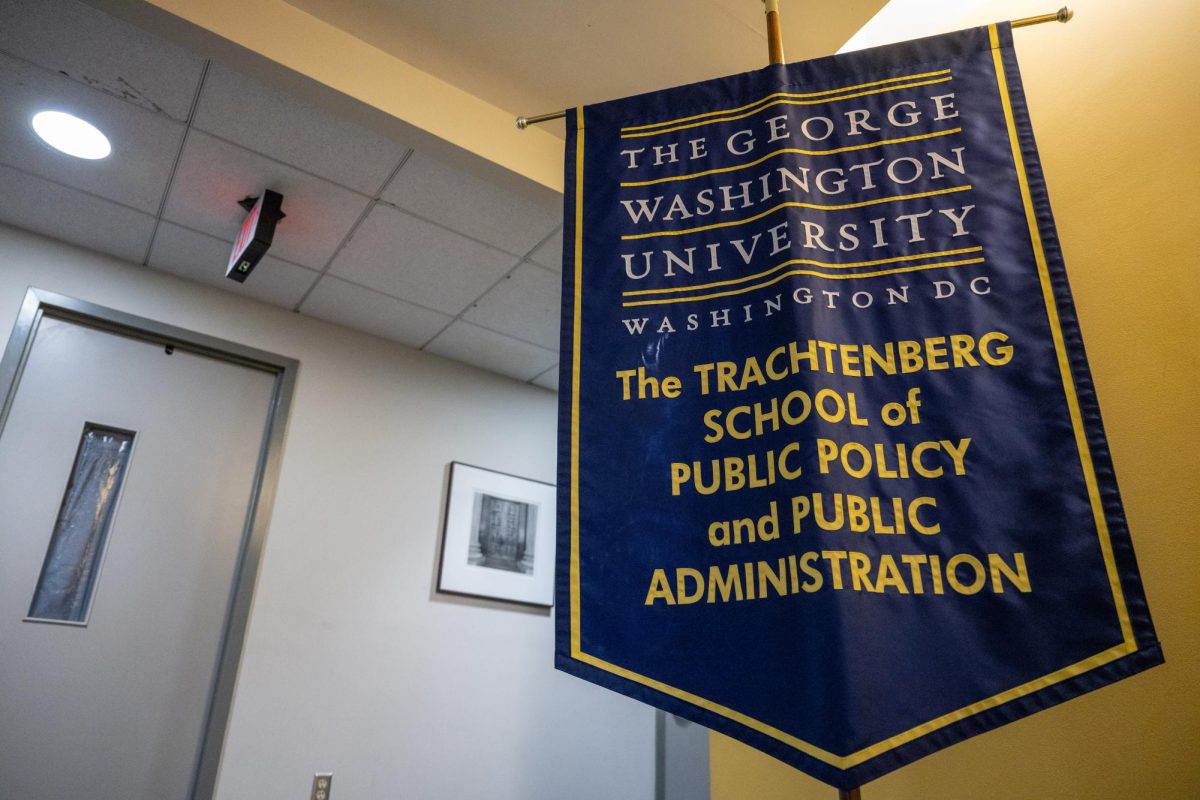The Trachtenberg School of Public Policy & Public Administration will debut a new Master of Arts degree in environmental and sustainability policy this academic year.
Officials announced the new program in July as a replacement for the Master of Arts in environmental resource policy, which the University has offered for more than a decade. Rachel Emas, the program’s director and an associate teaching professor, said the five foundational course categories of the new degree offering — economics, research, law policy, science, and culture and ethics — are representative of the demands sustainability leaders often face today.
The program consists of 36 credit hours, including 24 credits in required courses and 12 credits in elective courses from any academic department in the Columbian College of Arts & Sciences, according to the website.
Emas said the program has been in development for more than a year and a half, adding that the interdisciplinary approach allows students to be better prepared for different careers in the sustainability policy sector because they have the course load flexibility to take courses they’re interested in.
“I spent a year having conversations with students, alumni and faculty about what worked and what didn’t and how we can meet the needs of the environmental world,” Emas said. “We worked to redevelop the curriculum and to create the new name that better reflects that new curriculum.”
Emas said she expects students to be well-rounded and to understand the communities they “hope to serve,” which she said is why officials added the culture and ethics category to the program. The economics, research, law policy and science categories have similar courses to the foundational courses of the former program, both including required classes ranging from Introduction to Environmental Law to Research Methods and Applied Statistics.
Emas said she received lots of support for the program when it was announced in July, adding that alumni of the former program who graduated in May contacted her asking for their diplomas to be updated to reflect the program change.
“They thought that it was a really great tool as they move through their career paths, that focusing on sustainability is the future of the field, and that they wanted the degree name,” Emas said. “They seemed really excited to be alumni of this program.”
Emas said she sees room for growth within the program, which currently consists of about 40 students, but that she doesn’t want the program to get “too big” to where students feel “lost.”
“There is increased demand for sustainability leaders in any type of organization, anywhere in the world, and this is the type of program that will help to prepare those leaders,” Emas said.
Officials unveiled a new master’s concentration in Sustainability and Climate Communication within the School of Media and Public Affairs in April. Emas said there is an increased understanding of sustainability at the University level through organizations like the Global Food Institute and GW Alliance for a Sustainable Future and because of the effects of unsustainable practices at the “societal level.”
“To live unsustainably leads us toward really dark paths that we are feeling the very real impacts of every day,” Emas said. “To make decisions in a sustainable fashion, whether in policy or economics or any of any other big societal, institutional choices, I think that’s the only path forward if we hope to leave the world better than we found it.”
Benjamin Simon, an adjunct professor of economics and public policy who teaches Environmental and Natural Resource Economics, said his course evolves yearly to fit world topics and sustainability discussions in a broader context. He said this year he plans to discuss environmental justice issues with more empirical analysis requirements and added readings.
“The course has always captured a lot of what is in the ESP program,” Simon said. “It’s always captured issues of ethics and economics and sustainability.”
Simon said with the program’s new interdisciplinary approach through science, law, policy and economics, it’s easier to integrate the sustainability focus and prepare students for the professional world.
“Students are prepared for careers, governments or nonprofits, and they’ve got the skills to do that, which is writing skills, analytic skills, research skills,” Simon said. “That’s what I think people want to take away from the program.”
Addie Murphy, a part-time, second-year student in the program, said she now has more flexibility to take courses she is interested in because of the program’s interdisciplinary approach.
“I can definitely go more into certain electives that I think will be super helpful for my career moving forward,” Murphy said. “I can go and take a GIS class, geospatial mapping class, basically, and I can go take an animal ethics class if I want to.”
Murphy said with the program she is gaining skills she can use for her future in wildlife conservation policy, as she can take elective courses she is interested in while also fulfilling program requirements.
“I have an undergrad degree in biology, and I felt super prepared after that, but I didn’t have any really hardcore skills that would help me through my career,” Murphy said. “I feel like with this program, I’m gaining tools that I can use just in every single one of my classes.”





